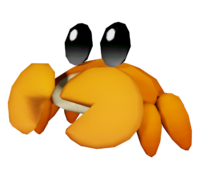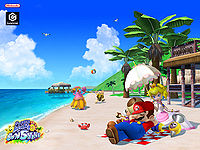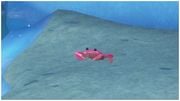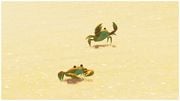Crab
- This article is about the generic species. For other instances of the name, see Crab (disambiguation).
| Crab | |||
|---|---|---|---|
 A crab in Super Mario 3D World | |||
| First appearance | Golf: Japan Course (1987) | ||
| Latest appearance | Super Mario 3D World + Bowser's Fury (2021) | ||
| |||
| |||
| |||
Crabs in the Super Mario franchise are crustaceans portrayed either in the same way as their real-life counterparts or as enemies.
History
Golf: Japan Course
A crab in Golf: Japan Course appears on the save menu. It is smiling and greatly resembles a Sidestepper.
Donkey Kong Country (television series)
In the Donkey Kong Country television series episode "Get a Life, Don't Save One," Dixie Kong owns a pet crab named Crabby. It is never actually seen on-screen, but it causes large amounts of havoc in the episode regardless.
Mario Kart 64
Crabs in Mario Kart 64 are obstacles on Koopa Troopa Beach, where they walk left and right, and can make drivers spin out on contact. Sidesteppers replace crabs in later installments.
Donkey Kong Country
Crabs in the Game Boy Advance version of Donkey Kong Country are interactive creatures in the Funky's Fishing minigame, where a crab appears randomly and scurries across the bottom of the water rather quickly. Multiple crabs can appear in one go, and catching them usually gives enough points for an automatic level up. When playing Funky's Fishing in the main game mode, only one crab can appear, and catching it has no effect on the score; however, if the crab is caught successfully, Funky Kong will give Donkey Kong and Diddy Kong a Photograph after the minigame ends. The crab does not appear again afterward.
Mario & Luigi series
Mario & Luigi: Superstar Saga / Mario & Luigi: Superstar Saga + Bowser's Minions
Crabs in Mario & Luigi: Superstar Saga live in Oho Oasis, where they can be jumped on or hammered to bury them halfway into the sand, but they get back up if Mario and Luigi leave and reenter wherever they are located. One of the bosses is a crab, Hermie III.
Mario & Luigi: Dream Team
Hermit crabs in Mario & Luigi: Dream Team are the main focus of the Mole Hunt game, where they must be dug up using the Mole Mario technique.
Super Mario series
Super Mario 3D World / Super Mario 3D World + Bowser's Fury
Tiny crabs in Super Mario 3D World and Super Mario 3D World + Bowser's Fury are minor interactive elements. Two of them first appear in a sandy portion in Super Bell Hill, where they are stationary at first, but they begin to run in a certain direction when approached until they jump into the sand.
Super Mario Odyssey
- Main article: Small animal
Small crabs in Super Mario Odyssey appear as wildlife in the Lake Kingdom, the Seaside Kingdom, and the Mushroom Kingdom. In the Lake and Mushroom Kingdoms, they are pink, and in the Seaside Kingdom, they are yellow. Like the other small animals, they will flee if Mario approaches them, and following them for an extended period of time causes them to burrow into the sand, often leaving behind a coin.
Gallery
Names in other languages
| Language | Name | Meaning | Notes |
|---|---|---|---|
| Japanese | カニ[1] Kani |
Crab | |
| Chinese (simplified) | 螃蟹[2] Pángxiè |
Crab | |
| French | Crabe[?] | Crab | |
| German | Krabbe[?] | Crab | |
| Italian | Granchio[?] | Crab; shared with Sidestepper | |
| Spanish | Cangrejo[?] | Crab |
Trivia

- In Super Mario Sunshine, one of the islands neighboring Isle Delfino, seen in the opening cinematic, is shaped like a crab. Additionally, a crab is visible in one piece of artwork for the game.
References
- ^ 1996. マリオカート64 (Mario Kāto Rokujūyon) instruction booklet. Nintendo (Japanese). Page 27.
- ^ iQue (2003). 马力欧卡丁车 (Mǎlì'ōu Kǎdīngchē) instruction booklet. iQue (Simplified Chinese). Page 27.





